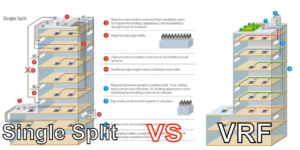Whether a VRV (Variable Refrigerant Volume) system is cheaper than a split AC depends on several factors, including installation, operational efficiency, and long-term maintenance. Here’s a comparison between the two:

1. Installation Cost
- VRV Systems: These are generally more expensive to install than split AC units. VRV systems are complex, requiring more extensive planning, ductwork, and multiple indoor units connected to a single outdoor unit. This leads to higher initial installation costs.
- Split AC: Split AC units are simpler and cheaper to install. Each room typically requires one indoor unit paired with its own outdoor unit, and the installation process is straightforward.
2. Energy Efficiency
- VRV Systems: While the initial cost is high, VRV systems are highly energy-efficient, particularly for larger buildings with multiple zones. They can precisely control the cooling for different areas and adjust refrigerant flow as needed, reducing energy consumption.
- Split AC: Split AC units are less efficient in larger buildings or homes because each unit operates independently. In smaller spaces, split AC can be energy efficient, but its costs tend to increase in multi-room setups compared to VRV systems.
3. Operation & Maintenance Costs
- VRV Systems: Although VRV systems are more expensive to maintain, they tend to offer long-term savings through better energy efficiency and durability, especially in large buildings.
- Split AC: Maintenance for split AC systems is generally lower on a per-unit basis, but if you have many units installed, the cumulative maintenance cost may be higher than for a single VRV system.
4. Scalability
- VRV Systems: Ideal for larger buildings or setups with multiple rooms that need individual temperature control. It is more cost-effective in the long term for big spaces.
- Split AC: Better suited for smaller spaces or individual rooms. Installing several split units in a large space can become expensive and inefficient.
5. Suitability
- VRV Systems: Best for large residential or commercial buildings where different zones require customized cooling or heating.
- Split AC: More suitable for smaller homes, single rooms, or spaces with simple climate control needs.
Conclusion
- VRV systems: More expensive upfront but can be cheaper to run in large spaces or multi-zone setups due to better energy efficiency and long-term cost savings.
- Split AC systems: Cheaper for small-scale installations but become less cost-effective as the number of rooms or zones increases.
If you are planning for a smaller residential setup, a split AC could be more economical. For larger setups or commercial applications, a VRV system would likely be more cost-effective in the long run.
Looking to install a commercial HVAC System or Duct work in your Business Area?
Contact Vipul Ac to learn about our HVAC Service
Call +91 9825636606 Today.
Related Posts
- what is Split ac ?
A split air conditioner, also known as a split AC, is an air conditioning system…
- Can Split AC run 24 hours?
Can Split AC run 24 hours? Yes, a well-maintained split AC can technically run 24…
- Do split AC need maintenance?
Yes, split AC units absolutely require regular maintenance to ensure optimal performance, efficiency, and lifespan.…
